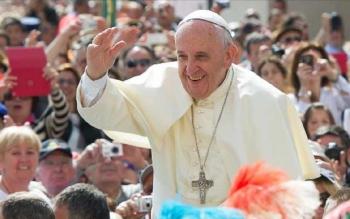Image Caption
Summary
By Shari Narine
Windspeaker.com Contributor
When Mike Cachagee read the statement—Letter of His Holiness Pope Francis to the People of God—one question came to his mind: “Why couldn’t he have done this for Indian residential school survivors?”
It’s a sentiment echoed by Heather Bear, vice-chief for the Federation of Sovereign Indigenous Nations in Saskatchewan.
“What are the reasons we didn’t get an apology?” she asked.
The Pope’s statement was issued Monday, Aug. 20 in the wake of the Pennsylvania grand jury’s findings that 301 priests in the state had sexually abused minors over the past 70 years. It marked the largest-ever investigation of sex abuse in the U.S. Catholic Church.
The Pope’s letter comes less than a month after the Assembly of First Nations passed a resolution at its annual general assembly held July 24 to July 26. It directed the AFN to “renew discussions with the Vatican” for an apology.
Cachagee believes that the AFN’s latest push to get an apology “is political”. Bear disagrees.
“To have that humanity for our people, an apology might strike the awareness we need from non-First Nations people,” said Bear, who believes it may have an impact by decreasing the racism and discrimination Indigenous people face in Canada.
The resolution was brought forward by two Saskatchewan chiefs: Michael Starr of Starblanket Cree Nation and Chief Reg Bellerose of Muskowekan First Nation. FSIN Grand Chief Bobby Cameron has called for the Pope to make the apology on treaty land, specifically in Saskatchewan, which he says has the highest number of Indian residential school survivors.
When the Truth and Reconciliation Commission released its Calls to Action in 2015, it said, “We call upon the Pope to issue an apology to survivors, their families, and communities for the Roman Catholic Church’s role in the spiritual, cultural, emotional, physical, and sexual abuse of First Nations, Inuit, and Métis children in Catholic-run residential schools.”
That apology didn’t come. The three other churches that operated residential schools all apologized years prior to the TRC’s work—the United Church in 1998, the Presbyterian Church in 1994, and the Anglican Church in 1993. The Canadian government apologized in 2008.
The Catholic Church was responsible for about two-thirds of the 130 residential schools that operated in Canada between the 1880s and 1996. More than 150,000 Indigenous children attended the schools. Thousands suffered emotional, physical and sexual abuse.
Cachagee said the Pope’s statement was “carefully crafted” and much of its content could easily be directed to Indian residential school survivors, of which Cachagee is one.
The Pope wrote, “We have realized that these wounds never disappear and that they require us forcefully to condemn these atrocities and join forces in uprooting this culture of death; these wounds never go away. The heart-wrenching pain of these victims, which cries out to heaven, was long ignored, kept quiet or silenced. But their outcry was more powerful than all the measures meant to silence it, or sought even to resolve it by decisions that increased its gravity by falling into complicity.”
Pope Francis also wrote, “We showed no care for the little ones; we abandoned them.”
Cachagee “doesn’t give a damn” whether or not the Pope apologizes and he certainly isn’t expecting one.
“He can’t apologize. It goes back to their whole theology, their philosophy. It’s about colonialism,” Cachagee said.
Bear says the apology is and important step in healing, especially for devout First Nation Catholics.
“We’re still at the point of truth and reconciliation,” she said. “It’s about healing. I think healing is paramount.”
In 2009, the former pope made an “expression of sorrow” to Canada’s Indigenous leaders. However, in 2010, the former pope formally apologized to survivors in Ireland of sex abuse by Catholic priests. In April, Pope Francis issued an apology to survivors of sex abuse by priests in Chile.
In 2017, when Prime Minister Justin Trudeau visited the Vatican, Pope Francis denied his personal request for an apology. In May, the House of Commons had passed a motion to formally ask Pope Francis for an apology for the Catholic Church’s role in the residential schools. The motion, presented by NDP MP Charlie Angus, was supported by all parties.
The AFN’s resolution also calls for the collection of the remaining $25 million owed by the Catholic Church toward the Indian Residential School Settlement Agreement.
The IRSSA was signed by the federal government and the four churches that operated the residential schools. The resolution also calls for Indian residential schools to be referenced by the federal government when it brought in the Indigenous Languages Act “as the principle cause of the drastic decline of Indigenous languages.”
Related:
http://ammsa.com/publications/windspeaker/moral-obligation-catholic-entities-what-bunk-editorial

